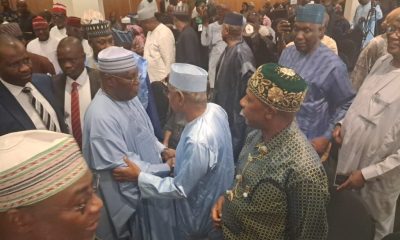Experts in the telecoms and communication industry have raised serious concerns over the working templates of the change in the former Ministry of Communications which was renamed Ministry of Communications and Digital Economy by the Federal Government recently.
A statement issued recently by the Deputy Director, Press & Public Relations of the Ministry, Philomena Oshodin announced that “The President of the Federal Republic of Nigeria Muhammadu Buhari, has granted the prayers of the Minister of Communications, Dr Isa Ali Ibrahim Pantami, to properly position and empower the Ministry to fulfill his Digital Economy objectives.
“The Ministry which supervises the ICT Sector has been renamed the Federal Ministry of Communications and Digital Economy to further expand its mandate to capture the goals of digitalization of the Nigerian economy in line with the Economic Growth and Recovery Plan (EGRP), one of the key agenda of the present administration.”
Also explaining further shortly after the Federal Executive Council meeting chaired by Vice President Yemi Osinbajo, the Minister said he made the move for the inclusion of Digital Economy in his ministry to situate the ministry so as to drive and monitor innovations in the digital space of the economy.
However, several industry analysts, who bared their minds on the development queried if other ministries departments and agencies (MDAs) that are directly in charge of digital financial activities were consulted ahead of the announcement because by the structure of the ministry, it has nothing to do with financial supervision.
They argued that dragging the fragile digital financial supervisors and platforms in Ministries of Finance, Technology, and some agencies like the CBN, SEC, National Broadcasting Commission (NBC) and others into the same basket with NCC, NITDA, NigComSat and others will lead to serious confusion in ease of governance.
In their views, the ministry is good and fine it was before the inclusion of Digital Economy as the inclusion will spark off inter-ministerial and or agency crisis which the current administration may not handle.
According to Dr Ken Akhigbe, “There is no way you can drive regulatory activities in a ministry that has Digital Economy as its arm without having the CBN, SEC, NBC, Lottery Commission, Insurance and even sports under the ministry because everything economic activity now is either digital or going digital sooner than later.”
“What we need from Pantami is tailored policies that will drive ease of doing business in the telecoms space. What we need from him now is to reach out to states’ governors and prevail on them to reduce charges on Right of Way (RoW) so that Infrastructure Companies (InfraCos) that had been licensed for years can hit the ground running on delivery of communications facilities including fibre optic cables, last-mile access and then, the most needed broadband than biting more than he can chew.
Also speaking, a top official of one of the leading ICT companies, who pleaded anonymity decried the development, saying “We least expected such strange and unthinkable nomenclature from the Minister. We have a lot of industry issue bordering the sector. Issues of forex, issues of including telecoms spare parts in the 43 items under forex restriction, ROW, infrastructure vandalism, Executive Order request by industry players on telecom infrastructure security and protection and so many challenges yet untouched.
Experts in the industry are of the view that the original nomenclature of the Ministry be maintained to avoid regulatory confusion.
In his defence of the new development, the Minister argued that “the former name was not only limiting in pursuing the objectives of a digital economy, but obsolete as it did not reflect the trends as emphasized by the International Telecommunications Union (ITU).
“The change of nomenclature will propel the Ministry to reposition its strategic objectives as laid out in the priority areas of this administration while accelerating growth and social inclusion.
Dr Pantami cited examples of global and African economies like Scotland, Thailand, Tunisia, Benin Republic and Burkina Faso among others who have adopted deliberate strategies and created Ministries of Digital Economy in line with global best practice, and especially the European Union which has a commissioner for Digital Economy.
Oshodin, the Deputy Director, Press & Public Relations of the Ministry, said “In a letter containing his approval, the President noted that the request is in line with global best practice which will further reflect the priorities of his administration. The approved name has been announced and adopted by the Federal Executive Council today, 23rd October 2019.”

 Latest1 week ago
Latest1 week ago
 Health1 week ago
Health1 week ago
 Football1 week ago
Football1 week ago
 News1 week ago
News1 week ago
 News1 week ago
News1 week ago
 Latest7 days ago
Latest7 days ago
 Crime1 week ago
Crime1 week ago
 Latest7 days ago
Latest7 days ago

